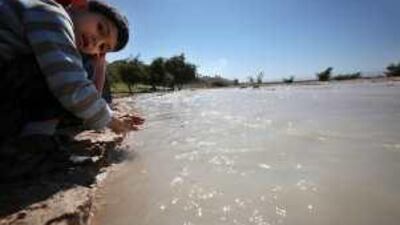AMMAN // Jordan marked World Water Day yesterday by warning that a scarcity of the precious resource remains the kingdom's biggest challenge. The UN and other international bodies rate Jordan, with a per capita water consumption of fewer than 145 cubic metres per year, as one of the world's 10 most thirsty countries. Among the others are Qatar, Kuwait, the UAE and Bahrain. According to Jordan's water and irrigation ministry, this figure is well below the international poverty line index of 1,000 cubic metres a year.
The situation is made worse by constantly increasing demand. The country's population of six million is growing at a rate of 2.3 per cent annually. Jordan's water resources have also come under increased strain with the influx of 500,000 to 700,000 Iraqi refugees since the US-led war in Iraq began in 2003. "Jordan's water situation represents the biggest challenge, not only in the region but in the entire world," Mohammad Najjar, the minister of water and irrigation, said at the ministry.
Jordan marked the day yesterday although World Water Day, an annual observance that started as an initiative at the 1992 United Nations Conference on Environment and Development in Rio de Janeiro, officially fell on Monday. "One of the key challenges the water sector faces is that the supply-and-demand equation is not balanced," Mr Najjar said. "Also water resources are limited, and the (process) of depleting underground water - are major challenges the ministry is facing."
He said the ministry faces included wasted water, illegal pumping of underground and surface water and the difficulty in enforcing laws against violators. Water scarcity is also exacerbated by the mismanagement of resources, experts said. Forty per cent of the kingdom's water is lost annually to worn-out pipes, leakage and water theft, according to a water ministry official. The country's dams currently hold 64 per cent of their total capacity of 215 cubic metres, a 16 per cent increase compared with last year. This winter, the country had its best rainy season in five years.
However, Dureid Mahasneh, an independent water expert and a former Jordan Valley Authority chief, said in an interview the recent rains "do not mean anything". "We depend on rainfall but the water deficit is increasing," he said. "The problem is that we obtain less than eight per cent of the rainfall, the rest is evaporated. "We don't know what to expect when it comes to rainfall. The country is mostly desert and evaporation is high. The underground water is depleted. Six aquifers are depleted and the other six are [heading that] way," he said. Another problem facing Jordan is the fact that its farmers continue to produce crops that need large amounts of water to grow.
"We wrongly export our water in the forms of tomatoes to Europe," Mr Mahasneh said. "There is no need to grow apricots and peaches in winter as they consume so much water. The priority should be for drinking water." For now, the water ministry is banking on two mega-projects to meet the increased demand. One is called the Dissi project, which is expected to provide Amman with 100 cubic metres of water per year from an ancient desert aquifer 325km south of the capital near the border with Saudi Arabia. The project, which kicked off this month, is expected to be complete in 2013 at a cost of US$990m (Dh3.6 billion).
The other proposed project is a canal linking the Red Sea and the Dead Sea Canal at an estimated $2bn. Feasibility studies are underway "The implementation of the project will need between 10 to 15 years if we secure the money. Both projects are ambitious, but the priority now is for proper water management," Mr Mahasneh said. "Jordan is in need of each drop of water." smaayeh@thenational.ae

